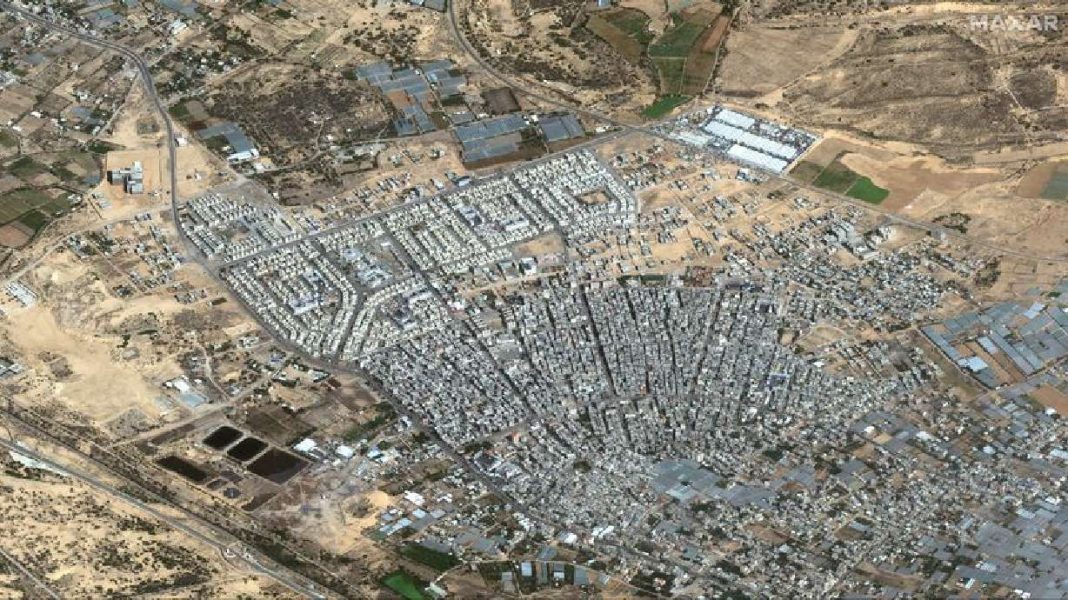GAZA — The Gaza cities of Rafah and Deir Al-Balah were hit by Israeli airstrikes, resulting in the death of 18 Palestinians, according to Gaza health officials. The news came on Saturday, sparking fears among the residents of the enclave that Israel might extend its ground offensive into the remaining areas where people have sought refuge.
Rafah, located on Gaza’s southern border with Egypt, has become a sanctuary for more than half of the enclave’s 2.3 million population. They have fled there as the Israel Defense Forces continue their nearly four-month-long war against the militant Hamas group.
Gaza health officials reported that an Israeli airstrike on a house in Rafah resulted in the death of 14 people, including women and children. However, there has been no confirmation from the Israeli military regarding the strike. A military spokesperson stated, “In stark contrast to Hamas’ intentional attacks on Israeli men, women and children, the IDF follows international law and takes feasible precautions to mitigate civilian harm.”
The ongoing Israeli bombardment, which was triggered by Hamas’ deadly attack on Israel on Oct. 7, has devastated Gaza and ignited a broader conflict in the region. In response to a deadly attack on U.S. troops, the United States launched airstrikes on Friday in Iraq and Syria against targets associated with Iran’s Revolutionary Guard and the militias it supports.
According to Gaza health authorities, who do not distinguish between militants and civilians in their counts, over 27,000 Palestinians have been confirmed dead since the war began. In the past 24 hours alone, 107 deaths have been reported, with thousands more feared dead amidst the ruins.
Israel initiated its war on Hamas following the Oct. 7 attack by Hamas militants, which resulted in the death of 1,200 people and the abduction of 253 people into Gaza. Over 100 of these hostages are still captive, as per Israeli counts. Israeli officials have stated their goal is to eliminate Hamas, which has pledged to repeat its October attacks, and to rescue the hostages, many of whom are women and children.
Refuge in Rafah
In recent days, tens of thousands of people have arrived in Rafah, carrying their belongings and pulling children on carts. This mass migration was triggered by one of the largest assaults of the war launched by Israeli forces last week to capture the main southern city, Khan Younis. Israeli Defence Minister Yoav Gallant announced on Thursday that forces would now advance towards Rafah.
One resident, Ahmed Bassam Al-Jamal, recounted his harrowing experience in Rafah, where his son was killed. He described the chaos and confusion in the aftermath of the attack, as he desperately searched for his children amidst the rubble.
In Khan Younis, residents reported that the army had destroyed a residential district near the city center. In the nearby city of Deir Al-Balah, another major hub for displaced people, medics reported that an airstrike on a house earlier on Saturday had killed four people.
Conflict persists in Gaza city
Despite Israel’s concentrated efforts in the south, residents and militants reported ongoing fighting in Gaza city. Gaza health officials reported two deaths due to sniper fire, and Israeli forces conducted arrests in the southern suburb of Tel Al-Hawa.
The Israeli military reported that its forces had killed dozens of Palestinian gunmen in northern Gaza. “During targeted raids in the northern and central Gaza Strip over the last day, IDF troops killed dozens of terrorists and destroyed numerous anti-tank missile launchers,” the Israel Defense Forces stated.
Hamas, Islamic Jihad, and other smaller militant groups reported engaging in intense battles with the army in both the north and south of the enclave. ”The more the occupation forces remain on the ground, the more we will get to them,” one Palestinian militant official said. “A martyr falls, another rises and takes the rifle, and we are ready to fight for many more months,” he told Reuters.
Mediators are currently awaiting a response from Hamas to a proposal for the war’s first extended ceasefire, drafted last week with Israeli and U.S. spy chiefs and communicated by Egypt and Qatar. It remains unclear when Hamas leaders will visit Cairo to respond.
A brief truce in November lasted just one week, during which militants released 110 women, children, and foreign hostages in exchange for Palestinians held in Israeli jails.




This is a devastating and tragic escalation of violence, with innocent lives being lost on both sides. It’s crucial for all parties involved to prioritize seeking a peaceful resolution and preventing further unnecessary bloodshed.